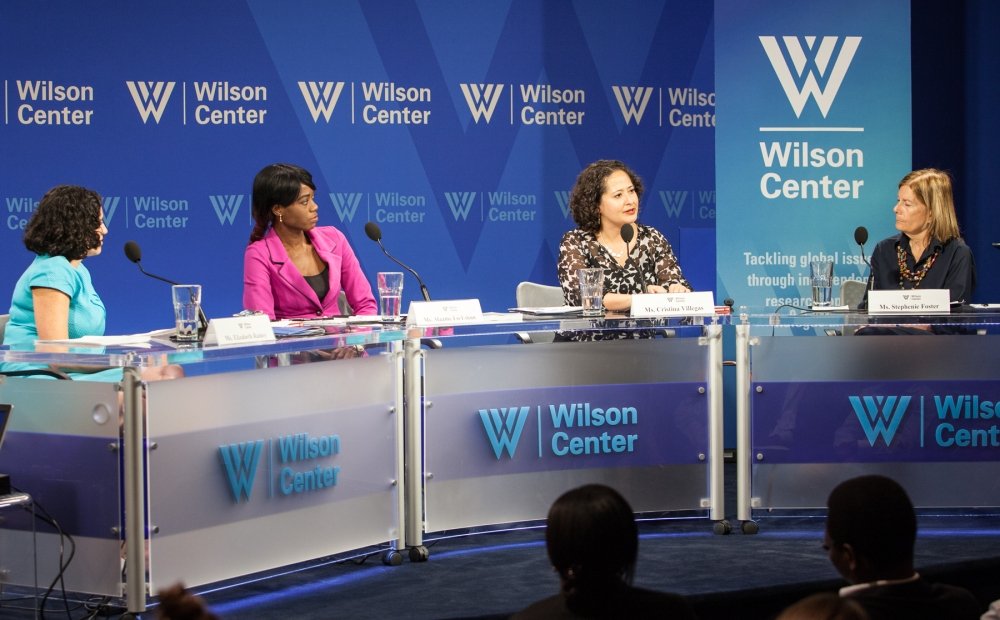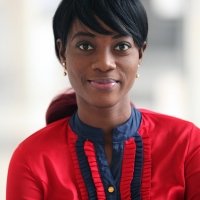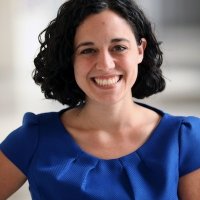Women, Artisanal Mining, and Peacebuilding in Africa: A Call to Action

On June 21, 2016, the Wilson Center Africa Program hosted a discussion that examined the role of women artisanal miners in peacebuilding and analyzed the intricate overlap between women’s economic empowerment and sustainable conflict resolution. Ms. Maame Esi Eshun, a visiting scholar from the Southern Voices Network* and Research Analyst at the African Center for Economic Transformation (ACET) in Accra, Ghana, presented her current research, based on both her scholarly work and direct experience monitoring the extractive resource service program within the ACET. In addition, Ms. Cristina Villegas, Technical Advisor and Counselor in the Mines to Markets Program at Pact offered up her expertise and extensive experience on the ground in Africa as well as in Washington, advocating on behalf of women in the industry. Finally, Ms. Stephenie Foster, Senior Advisor and Counselor to the Ambassador-at-Large for Global Women’s Issues at the U.S. Department of State, completed the panel, contextualizing the discussion given her three-decade career in domestic and international policy advocacy, specializing in the critical role women play in advancing public policy and development.
Ms. Maame Esi Eshun provided background and context to the artisanal mining industry as well as the challenges women face in this “poverty-driven sector.” Rationalizing that the artisanal mining industry will persist as long as there is poverty, Eshun proposed that policymakers focus on formalizing the artisan mining sector and enacting female-friendly mining policies, laws, and regulations, including better access to finance and credits; and improved environmental performance, health, and safety operations.
Ms. Cristina Villegas focused on the nuts-and-bolts issues affecting women miners that go overlooked by international policymakers, including issues of formalization, access to markets and equipment, and health and safety. After closely monitoring data in places like Colombia, Ethiopia, and Zimbabwe, Villegas ultimately recommended “more programs and less research,” especially programs that improve self-organization, business plans, economic strengthening, mining efficiency and the understanding of health concerns, particularly mercury exposure.
Ms. Stephenie Foster asked the audience to take a step back and evaluate the role women artisanal miners play in advancing public policy and development. Furthermore, Foster affirmed that countries can prevent, resolve, and manage conflicts by ensuring that women are engaged and empowered in decision-making. In particular, by introducing policies that underscore entrepreneurial training and economic skills at the local level, governments not only empower women in the artisanal mining industry, but also ultimately allow women to participate in the community and help mediate future conflicts.
This event was live-tweeted and an audio recording is available above. Follow the Africa Program on Twitter @AfricaUpClose and catch on the conversation with the hashtag #ArtisanalMining.
*The Southern Voices Network (SVN) is a consortium of research and policy organizations from across Africa that seeks to foster dialogue and increase the visibility of African perspectives within the U.S. policy arena. One of the main components of the SVN is the Africa Research Scholarship Program, through which the Wilson Center Africa Program hosts scholars from member organizations for a 3-month resident scholar program in Washington, D.C., allowing them to engage with U.S. policymakers and practitioners and conduct policy-oriented research. The SVN is made possible through the generous support of the Carnegie Corporation of New York. For more information, please see here.
Speakers

Regulatory Research Analyst at the Public Utilities Regulatory Commission, Ghana

Hosted By

Africa Program
The Africa Program works to address the most critical issues facing Africa and US-Africa relations, build mutually beneficial US-Africa relations, and enhance knowledge and understanding about Africa in the United States. The Program achieves its mission through in-depth research and analyses, public discussion, working groups, and briefings that bring together policymakers, practitioners, and subject matter experts to analyze and offer practical options for tackling key challenges in Africa and in US-Africa relations. Read more
